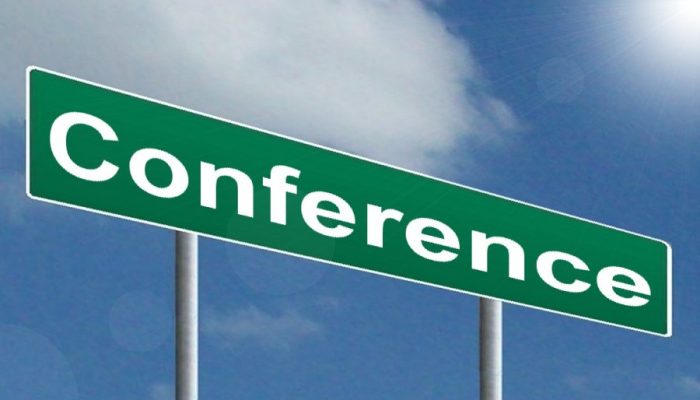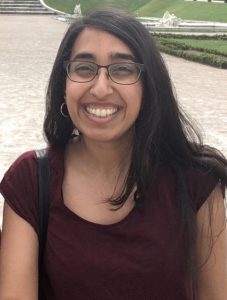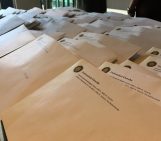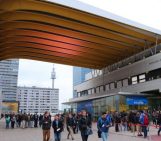
Conferences are an integral part of a PhD. They are the forum for spreading the word about the newest science and developing professional relationships. But as a PhD student they are more likely to be a source of palpitations and sweaty palms. This week Kiran Chotalia writes about her personal experience on conferences, and lessons learnt over the years.

Kiran Chotalia. PhD Student at Dept. of Earth Sciences, University College London, UK.
My PhD is a part of the Deep Volatiles Consortium and a bunch of us started on our pursuit of that floppy hat together. Our first conference adventure was an introduction to the consortium at the University of Oxford, where the new students were to present on themselves and their projects for a whole terrifying two minutes. At this stage, we had only been scientists in training for a few weeks and the thought of getting up in front of a room of established experts was scary, to say the least. Lesson #1: If it’s not a little bit scary, is it even worth doing? It means we care and we want to do the best we can. A healthy dose of fear can push us to work harder and polish our skills, making us better presenters. Overcoming the fear of these new situations takes up a lot of your energy. But it always helps to practice. In particular, I’ve always been encouraged to participate in presentation (poster or oral) competitions. Knowing that you’re going to be judged on your work and presentation skills encourages you to prepare. And this preparation has always helped to calm my nerves to the point where I’m now at the stage I can enjoy presenting a poster.
Regular work goals that crop up in other professions are often absent, especially when we’re starting out. The build-up to a conference acts as a good focus to push for results and some first pass interpretations. At the conference itself, it makes sure people come to see your poster and you can start to get your face out there in your field. Lesson #2: Sign up for presentation competitions. AGU’s Outstanding Student Presentation Award (OSPA) and EGU’s Outstanding Student PICO and Poster (OSPP) awards are well established. At smaller conferences, it’s always worth asking if a competition is taking place as, speaking from experience, they can be easily missed. They also give you a good excuse to practice with your research group in preparation, providing the key component of improving your presentation skills: feedback. Lesson #3: Ask for feedback, not just on your science but your presenting too. If you’re presenting to people not in your field, practice with office mates that have no idea what you get up to. By practicing, you can begin to find your style of presenting and the best way to convey your science.

Me, (awkwardly) presenting my first poster at the Workshop on the Origin of Plate Tectonics, Locarno.
Sometimes, you’ll be going to conferences not only with your fellow PhD students, but also more senior members. They can introduce you to their friends and colleagues, extending your network, more often than not, when you are socialising over dinner, after the main working day. Lesson #4: Keep your ear to the ground. These events provide a great opportunity to let people know you are on the hunt for a job and hear about positions that might be right for you. At AGU 2018, I became the proud owner of a ‘Job Seeker’ badge, provided by the Careers Centre. It acted as a great way to segue from general job chat into potential leads. A memento that I’ll be hanging on to and dusting off for conferences to come!
One of the biggest changes to my conferencing cycle occurred last year after attending two meetings: CIDER and YoungCEED. Both were workshops geared towards learning and research, with CIDER lasting four weeks and YoungCEED lasting a week. Lesson #5: Attend research specific meetings when the opportunity arises. Even if they don’t seem to align with your research interests from the outset, they are incredible learning opportunities and a great way to expand your research horizons. By attending these meetings, the dynamic of my first conference after them shifted. There was a focus on catching up with the collective work started earlier in the year. Whilst the pace was the most exhausting I’ve experienced thus far, it was also the most rewarding.
Between all the learning and networking, faces start to become familiar. Before you know it, these faces become colleagues and colleagues quickly become friends. In our line of work, our friends are spread over continents, moving from institution to institution. They tend to offer the only opportunity to be in the same place at the same time. This also results in completely losing track of time and catching up into the early hours of the morning, so the next lesson is more subjective. Lesson #6: Know your limits. Some can stay out until 4am and rock up at the 8.30am talk. I wish I was one of these people but I have a hard time keeping my eyes open past 12.30am. Whatever works for you!
After the conference finishes, you are often in a place that you’ve never visited before. Lesson #7: Have a break. If you can, even an extra day or two of being a tourist is great treat after a hectic build-up as well as the conference itself. If staying for a mini holiday post-conference is not an option, make sure you take some time when you get home to rest and readjust before you get back to work and start planning for the next one.
Last but not least, Lesson #8: Don’t forget to have fun. The stress surrounding conferences and your PhD in general can at times be all consuming. Remember to enjoy the small victories of finally getting a code to run or finding time on the SEM to analyse your samples. At conferences, enjoy being surrounding scientists that are just starting out and the seasoned professionals with a back catalogue of interesting stories. And if you’re lucky enough to be at a conference somewhere sunny, make sure to get outside during the breaks and free time to soak up some vitamin D!





